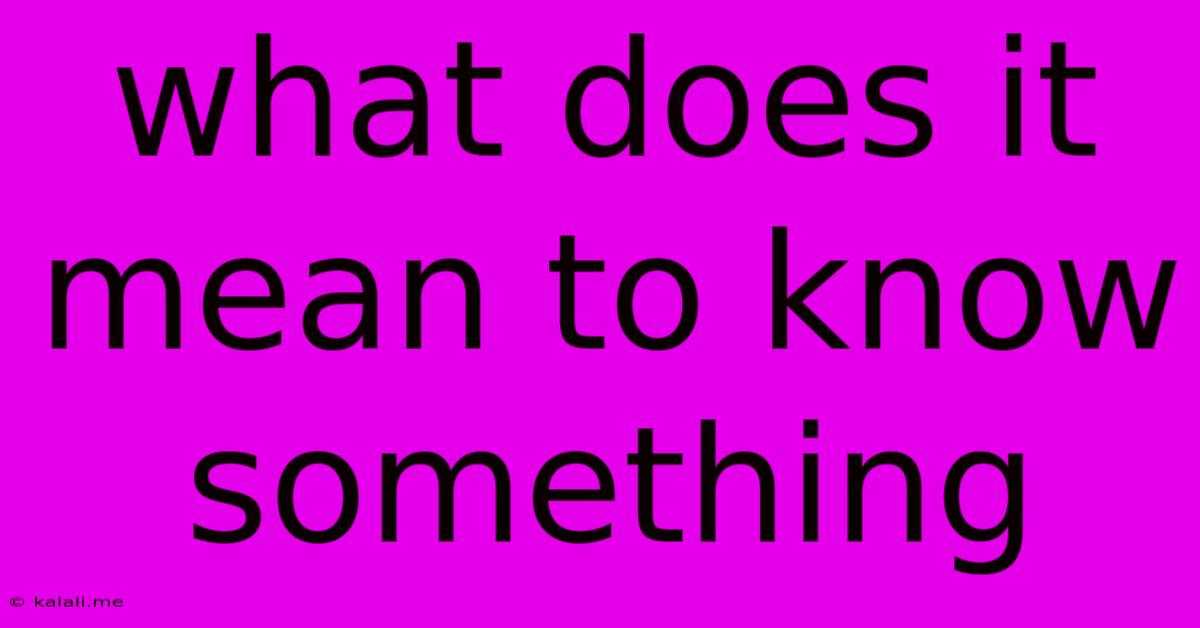What Does It Mean To Know Something
Kalali
May 25, 2025 · 3 min read

Table of Contents
What Does It Mean to Know Something? A Deep Dive into Epistemology
Knowing something. It seems simple, a fundamental human experience. But what does it truly mean to know something? This seemingly straightforward question has occupied philosophers for centuries, delving into the complexities of epistemology – the study of knowledge. This article explores different perspectives on what constitutes knowledge, examining various theories and their implications.
Understanding the Scope of "Knowing"
The definition of "knowing" is far more nuanced than it initially appears. It's not simply a matter of possessing information; it involves a deeper connection between the individual, the information, and the justification for believing that information. We might think we know something based on personal experience, testimony from others, or logical reasoning. However, each of these avenues presents potential pitfalls and challenges to the claim of true knowledge.
Different Perspectives on Knowledge
Several prominent theories attempt to define knowledge. Let's explore some of the most influential:
1. The Justified True Belief Theory: This classic definition states that knowledge is a justified true belief. To know something, you must:
- Believe it to be true.
- It must actually be true.
- Your belief must be justified – supported by evidence or sound reasoning.
However, this seemingly straightforward definition has been challenged by Gettier problems, which present scenarios where someone holds a justified true belief that nevertheless doesn't seem to constitute genuine knowledge.
2. Reliabilism: This theory shifts the focus from justification to the reliability of the process used to acquire the belief. If a belief is formed through a reliable cognitive process, it counts as knowledge, even if the justification isn't perfectly articulated. For example, knowledge gained through reliable scientific methods would qualify under this framework.
3. Coherentism: Coherentists argue that a belief is justified if it coheres with a larger system of beliefs. Knowledge isn't based on isolated facts but on the interconnectedness and consistency within an individual's belief system. This approach emphasizes the interconnected nature of our understanding.
4. Foundationalism: In contrast to coherentism, foundationalism suggests that knowledge rests on a foundation of basic, self-evident beliefs. These foundational beliefs are then used to justify other, more complex beliefs. This model emphasizes the importance of establishing a solid base for knowledge.
Beyond Theories: Practical Implications
Understanding the different perspectives on knowledge has practical implications in various aspects of life:
- Science: Scientific knowledge relies heavily on empirical evidence, testing, and peer review, aligning with reliabilism.
- Education: Effective teaching methods should aim to foster not just memorization but genuine understanding and justification of learned concepts.
- Critical Thinking: Evaluating information critically requires understanding different sources of knowledge and assessing their reliability. This ability to discern justified beliefs from unfounded ones is crucial in the modern information age.
- Everyday Life: Making informed decisions necessitates weighing evidence and considering the reliability of information sources. Understanding the nuances of knowledge helps us navigate a complex world.
Conclusion: The Ongoing Pursuit of Knowledge
The question of what it means to know something remains a complex and fascinating area of inquiry. While no single theory perfectly encapsulates the multifaceted nature of knowledge, exploring these different perspectives allows us to appreciate the depth and complexity involved in acquiring and justifying our beliefs. Ultimately, the pursuit of knowledge is an ongoing process of critical inquiry, reflection, and refinement. It's a journey of continual learning and understanding, constantly challenging our assumptions and expanding our horizons.
Latest Posts
Latest Posts
-
2 Year Old Gas In Car
May 25, 2025
-
The Blade Itself Incites To Deeds Of Violence
May 25, 2025
-
10 Speed Cassette 11 Speed Hub
May 25, 2025
-
How To Fix Door Frame Cat Scratched
May 25, 2025
-
End Game Movie 2006 Ending Explained
May 25, 2025
Related Post
Thank you for visiting our website which covers about What Does It Mean To Know Something . We hope the information provided has been useful to you. Feel free to contact us if you have any questions or need further assistance. See you next time and don't miss to bookmark.